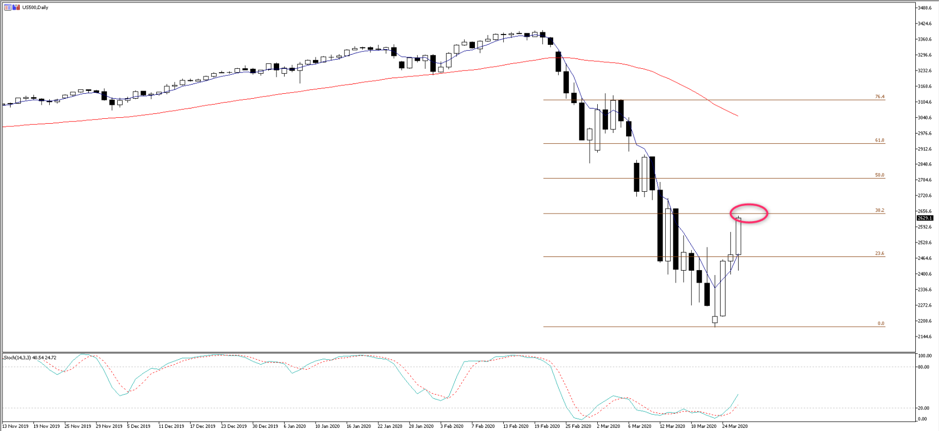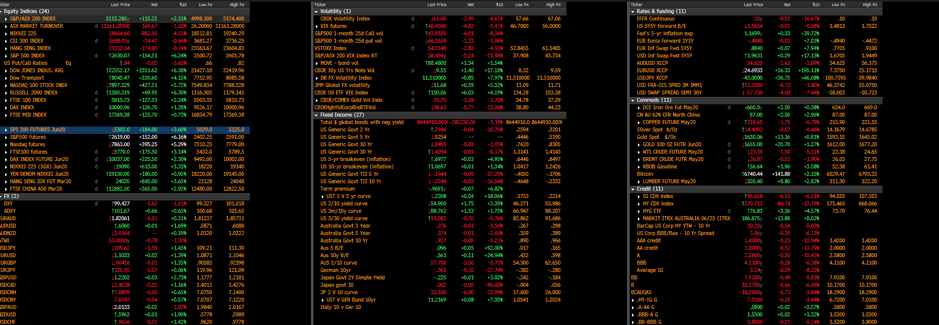- English (UK)
2641 in S&P 500 futures (the 38.2% fibo of the Feb-March sell-off) and 2650 in the S&P 500 cash is where I will be keen to focus on and assess how participants play this. For now though, the upside in equities seems the more likely path even if many markets are approaching 20% from the 23 March low.
(Daily chart of US500)

Certainly, volumes in Europe look lightweight, where we see the French CAC putting on a further 2.5% - taking the 5-day gain to 17% - however, despite a strong move volumes were 38% below the 30-day average. Italy closed +0.7%, on volumes 32% below the 30-day average, and the underperformance looks likely as a result of the virus count accelerating again, with 8215 new deaths and 6203 new cases – the most in five days.
Low volumes are also true in the US, where volumes in the S&P 500 were 12% under the 30-day average and we see defensive sectors outperforming cyclicals. Participation has been good though where 91% of stocks were higher.
The full market monitor

Futures as a guide for Asia
In futures markets and by way of a guide for Asia, we see Aussie SPI futures +3.6%, taking the move here to 21% from the 23 March low of 4372. Nikkei 225 and Hang Seng futures sit up 3.1% and 3.6% respectively from the respective cash close, so we should see another strong open for Asia.
There has been a strong focus on the incredible increase in the size and daily run-rate of the Fed asset purchases. Where its balance sheet sits at a punchy $5.25t and understand that on the current trajectory it will be closer to $7t by June, and we’d also likely see excess reserves above $4t. The daily purchases are into $100b on Treasuries and Mortgages and on the current trajectory at some stage will be buying a similar amount as the government is increasing the deficit in the $2t fiscal package likely to be passed in the House tomorrow.
US Treasury yields are lower by some 3-5bp and volatility has come out of the bond market and the Fed may take credit for that, while inflation expectations have pushed up a touch. The same suppression of volatility is not true in equity land, where implied vols remain elevated with the VIX anchored for now at 61%. The bulls like the 87bp move lower in high yield credit and that despite WTI and Brent crude falling 6.6% and 3.3% respectively with the IEA executing director (Faith Birol) suggesting worldwide demand could drop 20 million barrels a day.
Another key talking point we take into Asia has been the moves in FX markets, with the USD index -1.7%, which is its worst day since December 2015. USD funding is clearly normalising in FX basis, with USDJPY cross-currency basis -36bp to -43, while EURUSD basis now resides at +24bp. High beta currencies are working well, with the MXN and NOK continuing to find solid upside, with shorts running for the hills. USDJPY was on the radar as a short, which we put out on our Telegram channel (feel free to sign up) and this has dropped into 109.50, and I stay short here for now.
The USD has not reflected economics for a while, and there wasn’t much reaction to the 3.2m increase in weekly jobless claims, although, traders had already positioned for a poor number given the narrative from California about over 1 million claimants here. However, the combination of the Fed’s massive balance sheet expansion (that won’t be inflationary) is now a USD driver, while the US, has now 81,321 cases of COVID-19 and has become the epi-centre of virus concerns.
We’ve seen strong buying in GBPUSD too, smashing through the 38.2 retracement of the recent sell-off from 1.3200 to 1.1412 – happy to feel more upside is in store for now. EURUSD has maintained a footing above 1.10 and is close to the highs of the day and is eyeing a move through the 200-day MA and will test the 50% retracement of the 1.1495 to 1.0636 sell-off at 1.1065. The USD will remain offered as long as equities don’t rollover.
Gold has gained 1.2% in USD terms to $1635, but it is a USD play and its hard to find gold appreciating in any other major currency. We’ve seen the spread with the futures continue to come in but remains elevated at $14.
The material provided here has not been prepared in accordance with legal requirements designed to promote the independence of investment research and as such is considered to be a marketing communication. Whilst it is not subject to any prohibition on dealing ahead of the dissemination of investment research we will not seek to take any advantage before providing it to our clients.
Pepperstone doesn’t represent that the material provided here is accurate, current or complete, and therefore shouldn’t be relied upon as such. The information, whether from a third party or not, isn’t to be considered as a recommendation; or an offer to buy or sell; or the solicitation of an offer to buy or sell any security, financial product or instrument; or to participate in any particular trading strategy. It does not take into account readers’ financial situation or investment objectives. We advise any readers of this content to seek their own advice. Without the approval of Pepperstone, reproduction or redistribution of this information isn’t permitted.
